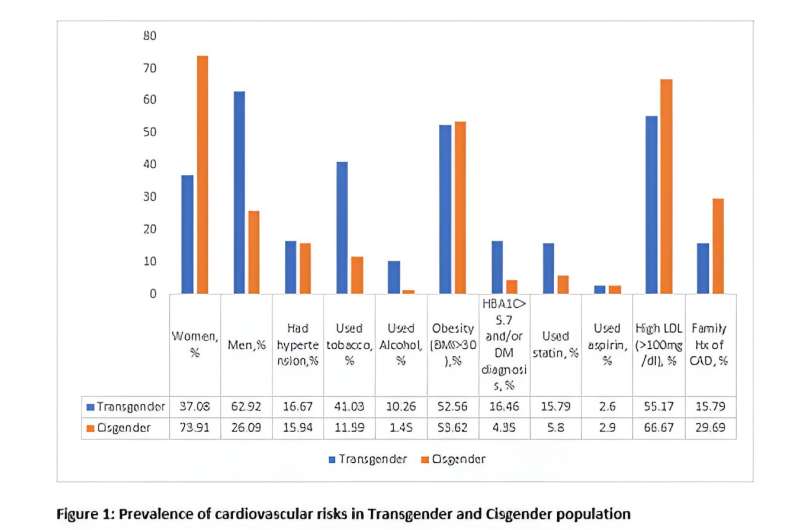This article has been reviewed according to Science X's editorial process and policies. Editors have highlighted the following attributes while ensuring the content's credibility:
fact-checked
trusted source
proofread
Transgender adults in rural US had disproportionately higher cardiovascular disease risk

Transgender adults living in the rural Appalachian area of the U.S., were more likely to have cardiovascular disease risk factors, like tobacco use, obesity and high blood pressure, thank their cisgender peers, according to a preliminary study to be presented at the American Heart Association's Scientific Sessions 2023. The meeting, to be held Nov. 11–13, in Philadelphia, is a premier global exchange of the latest scientific advancements, research and evidence-based clinical practice updates in cardiovascular science.
There is growing evidence that transgender people are impacted by health disparities across a variety of cardiovascular risk factors compared with cisgender people, or those who are not transgender. According to a 2021 American Heart Association scientific statement, transgender and gender-diverse people, a growing population in the U.S., have reported disparities in poor health and even increased death from cardiovascular disease because of the higher prevalence of health risk behaviors.
"We know there is increased cardiovascular disease risk among transgender people across the U.S. We also know there is a disproportionate burden of cardiovascular disease and associated risk factors in rural areas of the country, including a higher incidence of obesity and Type 2 diabetes," said lead study author Ebubechukwu Ezeh, M.D., a cardiovascular disease fellow at the University of Kansas, in Kansas City, Kansas.
"Data indicates that West Virginia, which is wholly in the Appalachian region, has one of the highest per capita rates of transgender youth in the country, so we sought to study the burden of cardiovascular disease risks in the transgender population in this region."
The study included 89 self-identified transgender adults and 69 randomly selected cisgender individuals, average age 29-years-old for participants in both groups. Participants lived in Huntington, West Virginia and neighboring areas of rural Ohio and Kentucky between November 2022 to February 2023. Researchers examined the prevalence of tobacco use, high blood pressure, prediabetes or Type 2 diabetes, obesity and high cholesterol among all participants.
The analysis found:
- Participants who identified as transgender were more than six times more likely to use tobacco and almost four times more likely to have prediabetes or Type 2 diabetes.
- Those in the trans-male group were 13 times more likely to have obesity (defined by body mass index of at least 30 kg/m2) and nearly 3.5 times more likely to have high cholesterol compared with trans-females. More than 60% of the transgender participants self-identified as trans-males.
- The likelihood of alcohol use, tobacco use and the need for cholesterol-lowering medications was notably increased by 11, 6 and 4 times, respectively, in transgender individuals who received gender-affirming surgery or hormone treatments when compared to other transgender participants, however, the number of people in the study limits the generalization of these findings.
While a limitation of the study is its small size, these findings shed additional light on the higher cardiovascular risks experienced by transgender people living in rural areas, according to the researchers.
"These findings highlight the importance of identifying and addressing the needs of this population by developing interventions targeted at reducing these disparities. With these findings, we can intentionally work towards improving the overall health and well-being of transgender individuals and reducing their cardiovascular risk," Ezeh said. "Because our study population is relatively young, we believe that early intervention may reduce the future risks of death from cardiovascular causes."
Future research should include larger studies on transgender people and more comprehensive assessments of the effects of different hormone therapy regimens on cardiovascular risks, according to Ezeh.
"The findings of this small study highlight two critical areas of concern—the potential increased cardiovascular risk among transgender people, along with the increased cardiovascular risk among people living in rural areas. These disparity gaps pack a one-two punch to our transgender patients and communities for a number of reasons," said Carl Streed Jr., M.D., M.P.H., F.A.C.P., F.A.H.A. volunteer chair of the writing group for the American Heart Association statement on transgender and gender diverse populations, an assistant professor of internal medicine at Boston University School of Medicine and the research lead at the GenderCare Center at Boston Medical Center.
"The physical risks are likely heightened by the mental stress that many LGBTQ+ people encounter due to discrimination that is often more prevalent in rural America, especially among states with policies limiting access to gender affirming care. The American Heart Association supports the need for more research and initiatives to ensure equitable health and health care for all people, especially persons and communities most at risk due to various diversity gaps in care whether they are based on racial, ethnic, sexual and/or gender identities, socioeconomic status or geography."


















